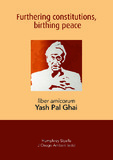The Ghai in our Constitution
Abstract
Professor Yash Pal Ghai did not just lead the process of writing the Constitution
of Kenya; he is actually embedded in it. Our Constitution benefited not just from
Ghai’s long experience in negotiating peace but also his philosophy and approach to
constitution-making. As a person who has taught and studied the new Constitution
since its inauguration on 27 August 2010, I have often been astonished by its
uniqueness. Many times I have pondered on the ingenuity of its authorship and I
have become more and more convinced that most of this has its origins in Ghai;
born of his own personal experiences, professional engagements and the resultant
intellectual ideas.
Ghai was born and brought up in colonial Kenya. Growing up as an Asian
exposed him to discrimination on the basis of race, and as part of a numerically
disadvantaged population. Even upon independence in 1963, Kenyan Asians
remained a racial other and minority. Pretending to act on behalf of the majority,
the emergent black African elite simply took the place of the minority white race
that ruled during the colonial epoch. The Asians remained subordinate.1
Even in
the greater East African region, then encompassing Kenya, Uganda and Tanzania,
the experience of Asians was not just, a situation Ghai and his brother reflected
on.2
In August 1972, the world watched in awe when Uganda’s President Idi Amin
ordered all ‘Indians’ out of the country within 90 days. At a personal level, Ghai has narrated to me experiences of discrimination both at the University of East
Africa Dar es Salaam (Dar) – where he taught and served as Dean of Law – and at
the East African Community (EAC) where his nomination as Chief Legal Officer
was resisted by Kenya, which preferred a black African instead. Inevitably, this
background must have informed Ghai’s expansive scholarship on management of
diversity and inclusivity.
But it is not in Ghai to be a silent minority. He speaks truth to power, which in
the 1970s caused a lot of tension between him and the emerging black African elite
in the region. His book, Public law and political change in Kenya,3
co-authored with the
late Prof Patrick McAuslan, confirmed the suspicion that he would not be a ‘partner
in crime’. The book, which is the first account of the social, political and legal
developments in East Africa since the colonial epoch, offered a critical approach to
the subject and was not taken kindly by those then in authority. And for this Ghai
suffered. His appointment as the first African Dean of the University of Nairobi’s
Faculty of Law was opposed by the top echelons of the Kenya African National
Union (KANU) leadership. Unbeknownst to him, he had been declared persona
non grata in his own country. Unwanted at home and welcomed a bit more in the
neighbourhood, Ghai did not report to his post at the University of Nairobi, did not
stay at Dar for longer than a year, but instead headed overseas.
Collections
- General Colletion [170]

